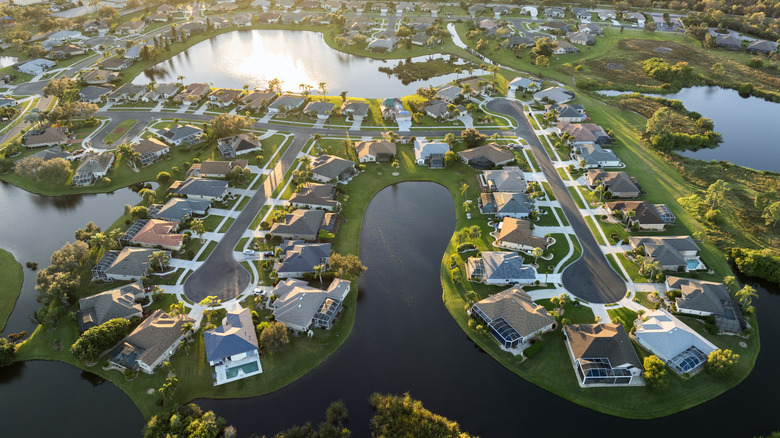The Hidden Reasons A Florida Retirement Might Not Be The Affordable Dream It Once Was
Some people work their whole lives just to move to a state with year-round tropical weather, like Florida. As a South Florida native, I'm pretty familiar with snowbirds. In specific neighborhoods — such as where my Baby Boomer parents live — some snowbirds don't just flock for the season; they end up staying for the final chapters of life. The sunshine, the sparkling blue waters, and the island-style living (without actually being on an island), allows retirees to escape their colder states, move at a slower pace, and feel gratitude for how far they've come. Except, new data and reports show that Florida is not actually the "bees-knees" for retiring. While a Seniorly report claims it's the worst state for aging in place, the follow-on data on the cost of living may be just as bleak.
Many people find Florida attractive because it has no state income tax. However, if you own a home or a condo, you can't dodge those pesky, secret fees in the fine print. We're talking about homeowners association (HOA) fees, insurance, and special assessments — and they've been on the rise, making ownership nearly unaffordable for many, especially in retirement. Sure, Florida has award-winning retirement communities, like the Jimmy Buffett-themed Margaritaville in Daytona Beach, but it's not always what you expect after signing on the dotted line.
What are these extra fees and why are they sky high?
First things first: What even are HOA fees, insurance payments, and special assessment bills? A homeowners' association is essentially a property management organization that oversees and upholds the standards for a complex or neighborhood. It hires landscapers and cleaning companies and ensures the community complies with city code requirements. To keep the association in business, you must pay a fee. According to a Redfin study, this fee keeps climbing. In August 2024, it reported that dues in cities like Tampa, Orlando, and Fort Lauderdale were more than 15% higher than the year before. The increase is driven by higher insurance fees, which also go hand in hand with special assessment fees.
Homeowners insurance is needed for emergencies — especially in Florida, where natural disasters like hurricanes are common. Moreover, back in 2021, a condo in Miami, Surfside, partially collapsed, killing nearly 100 people, according to NBC. Ever since, insurance companies have tightened their policies. As a condo owner in Fort Lauderdale, Florida, my HOA had a company assess my building because it violated city code. To fix this, the owners were charged a special assessment fee. On top of my mortgage, HOA fees, and insurance, I also must pay around $260 monthly for the next 18 years to cover it, and I'm far from retirement. These fees showed up after I closed on the condo, and they're something to be wary of when moving.
What to look out for when buying a Florida home
When buying a house in Florida, you want to be cautious of a few things to avoid extra fees. First, find out when the buildings in the condo complex were built, or when the home was built. Florida has a 40- to 50-year building recertification assessment, and following the Surfside tragedy, insurance companies have become stricter. If your building falls into this category, you may be up for some structural fixes, which, like my condo, can be costly.
One benefit of an HOA is that it sometimes maintains "reserves," which are money set aside for major repairs. You'll want to make sure that the place you are buying has enough reserves that make you comfortable, as this can offset a portion of potential special assessment fees.
If the money continues to stack up — especially in retirement — it might be worth considering retirement home options as well. It goes without saying that some can be just as expensive, like the wildly luxe home in Miami that is modeled after a famous Paris hotel, but with research, some options are more affordable (depending on your budget, of course). Ultimately, moving to Florida isn't out of reach, but you may need to save a little more than you originally planned.


